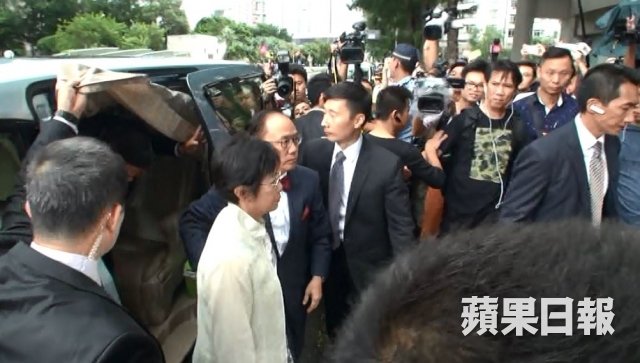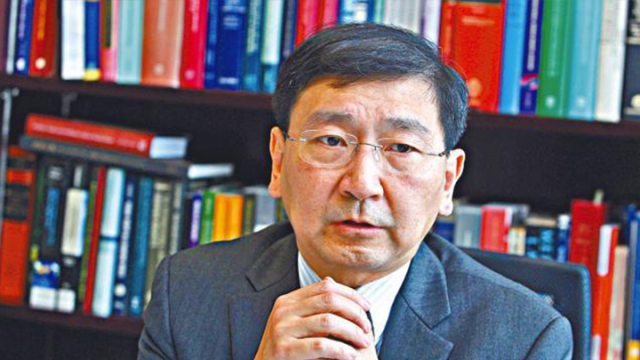By Victoria Tin-bor Hui
Hong Kong has over the past year been pelted by political storms. The tsunami of events need to be seen as an integrated whole. Together, they represent a concerted effort to rein in the pillars of Hong Kong’s freedoms.
The long list of storms include Liaison Chief Zhang Xiaoming’s claim that the Chief Executive has ‘overriding power’ over the executive, legislative, and judicial branches, Hong Kong and Macau Association Chief Chen Zuo’er’s claim that Hong Kong has failed to “implement de-colonisation’, the Hong Kong University Council’s veto of the appointment of Johannes Chan as a pro-vice chancellor for human resources, the ICAC’s charges against Donald Tsang for misconduct in public office, and mainland state media’s attacks on Li Ka-shing for being unpatriotic.

What do these political storms have in common? Chen Zuoer gave us some hint last December when he warned Hong Kong of “a long-term struggle with the forces that bring calamity to Hong Kong.” He vowed to take the struggle “from the street to the law courts, to the Legislative Council, to inside the government, and to universities and secondary schools, etc.”

A month later in January, Vice-President Li Yuanchao added that the central government’s struggle against pro-democracy forces was not over and “really interesting parts of the show are yet to come.” And they came.
The police are widely seen as having already lost their even-handedness. During the occupy movement, they were criticized for using excessive force. After occupy, the police have caused grave public concern by speedily arresting occupiers while overlooking law-breaking by pro-establishment protestors. And they have dragged out investigation of abusive officers. Observers worried that the police would use prosecution of occupiers to turn the judiciary into another political tool.
To the dismay of pro-government forces, judges have dismissed police evidence for being ‘strange,’ ‘dubious,’ and ‘impossible.” Other than a female protestor who was convicted of “assaulting a police officer with her breast,” the majority of defendants have been cleared.

Analysts thus speculate that Zhang’s talk of the Chief Executive enjoying ‘overriding’ authority was targeted at the judiciary. No wonder the normally reticent Chief Justice Geoffrey Ma Tao-li and former Chief Justice Andrew Li felt compelled to openly defend the continued independence of the law courts.
It would be a mistake to think that the ICAC’s formal prosecution of Donald Tsang is proof of the rule of law. If the former Chief Executive is not above the law, why is it that the current Chief Executive CY Leung and his appointees Paul Chan and Franklin Lam, who also failed to declare conflicts of interest, are free of charges? Unless the ICAC gives the same treatment to those in power and those out of power, it would be difficult to preserve the principle that everyone is equal before the law.
Following quickly on the heels of the dismissal of Paul Tang as Secretary for the Civil Service, Donald Tsang’s prosecution could be seen as another move in a struggle against the civil service. Complaints have been floating in the media that C. Y. Leung’s political appointees find it difficult to rein in meritocratic civil servants. Another legacy from British colonial rule, the impartial civil service is a natural target.
Along with Tang, Tsang Tak-sing was also dismissed as Secretary for Home Affairs. Unlike Tang who climbed up the civil service career ladder, Tsang was a political appointee and a Beijing loyalist. His fault was being the brother of Legco president Jasper Tsang Yok-sing. The Tsang brothers are traditional patriots. The problem is that Jasper Tsang upholds established LegCo rules and procedures, thus making it difficult for CY Leung to exert tighter control over LegCo. When Tsang, citing rules of procedure, did not approve the pro-establishment legislators’ call to delay the vote on the controversial electoral bill, even his long-standing pro-Beijing background could not save him from falling victim to the current struggle.
Hong Kong University has been another major target of this struggle. CY Leung has exploited his appointment power to stack various university councils with his loyalists. His control over the HKU Council was handy in securing a veto of the Johannes Chan appointment. The suppression of Chan aims not just to punish him for tolerating Occupy Central leader Benny Tai, but also to stifle the autonomy of Hong Kong’s top university, with its rich colonial legacy. Analysts are thus worried that the next victim would be the vice chancellor Peter Mathieson, who has had nothing to do with the occupy movement.

This campaign to battle forces of autonomy is indeed full of interesting twists and turns. In addition to the judiciary, Legco, the civil service and the universities, even apolitical business leaders cannot stay out of trouble. Hong Kong’s richest tycoon Li Ka-shing, long a darling of the Central Government, is under attack by state media for the “unpatriotic” move of selling some of his Chinese investments.
In this all-out struggle to rein in the pillars of freedom in Hong Kong, economic rights are fast vanishing along with civil rights.

Jasper Tsang, who has become more vocal lately, openly expresses his worry about what all the individual storms add up to: “If the central government’s interference goes deeper and deeper into Hong Kong’s internal affairs, at some point quantitative changes will become qualitative changes. Even if Beijing does not abrogate ‘one country, two systems’ by name, the central government will exert de facto direct rule over Hong Kong.”
Tsang understands the powerful better than most of us. This show is far from over. Even more interesting parts are yet to come.
Victoria Tin-bor Hui is an Associate Professor with the Department of Political Science at the University of Notre Dame. This commentary is based on information posted on her blog on the Umbrella Movement.
